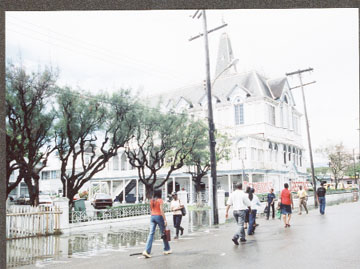Chairman of the Private Sector Commission (PSC) Captain Gerry Gouveia has lashed out at what he described as the “reckless and indiscriminate garbage disposal culture” among some of the city’s commercial houses.
He declared that the loss of trading resulting from flooding in the city “is as much the fault of the absurdly irresponsible dumping of garbage in drains and alleyways by ‘private’ disposal services recruited by some businesses” as it is the fault of weaknesses in the ability of the authorities to drain the city after a heavy downpour.

“It is true that the reasons for flooding that generally come from the municipality are repetitive and irritating. What’s the excuse of the business community? To my mind the only excuse that they have is their own recklessness and the guilty parties really ought to be ashamed to simply dump all of the blame at the door of City Hall”, he declared
And according to the PSC Chairman beefing up enforcement of the by-laws relating to the disposal of garbage is only part of the answer to the problem. “We need to find ways of persuading the business community, which, in large measure, is the real custodian of the city that the prevailing culture of garbage disposal works against their own interests.”
Earlier this week Stabroek Business spoke with several city businessmen many of whom bemoaned the loss of trading resulting from the flooding being caused by the recent intermittent downpours and blamed their current woes in the Georgetown City Council. However, according to Gouveia it was clear that the overwhelming volume of garbage in city drains and canals “is making an already difficult situation far worse.”
Meanwhile, Gouveia told Stabroek Business that while the surfeit of shopping malls that are “springing up in the city” are reflective of “a growing and increasingly vibrant private sector”, the available evidence suggests that “in many cases” there is an indifference to environmental laws governing the disposal of builders’ waste.
“One has only got to walk along Regent Street to see the deposits of waste in drains and on parapets. It really makes no sense to have a commercial culture that has very little regard for responsible waste disposal. In a sense, those who are guilty of irresponsible waste disposal are really guilty of sabotaging our capital.”
And according to Gouveia when the cumulative cost of flooding in the capital is taken into account, it has now become imperative that a “sustained and aggressive campaign” be mounted to clear the city’s clogged canals, drains and alleyways and at the same time to seek to change the prevailing culture of garbage disposal. “If this may sound like just another routine and perhaps quite costly recommendation we only need to look at the greater price that we pay every time there is a heavy downpour,” Gouveia added.
Meanwhile, according to Gouveia there remain “glaring weaknesses” in the general application of environmental sensitivities as a corollary to the local commercial culture. “What is lacking in some sections of the business community is a sense of the relationship between being environmentally responsible and their own sense of well-being as businessmen. I believe that the reckless dumping of garbage and builders’ waste, among environmental transgressions is a function of a lack of sensitivity to the relationship between business and the environment.
Some business houses tend to focus on trading activity within the confines of their premises without stopping to consider that what happens outside their premises can have an equally significant bearing on how their businesses perform,” he added.





